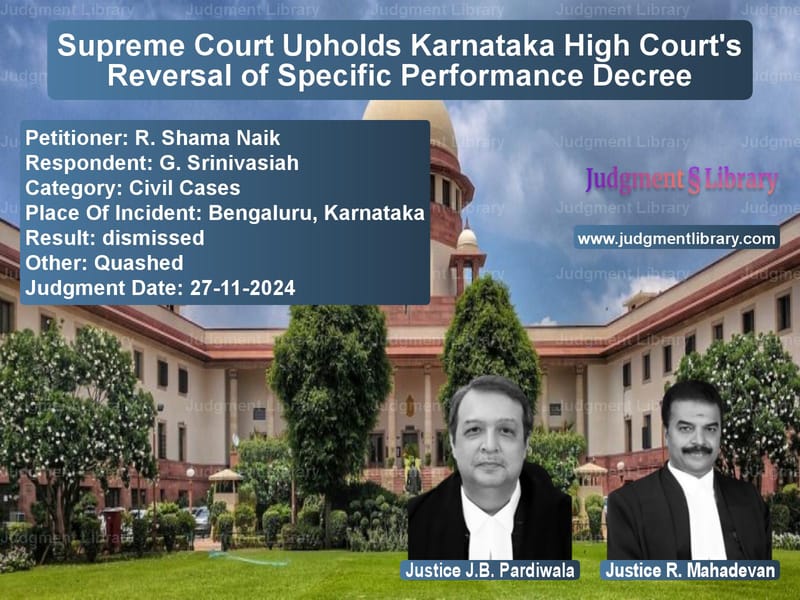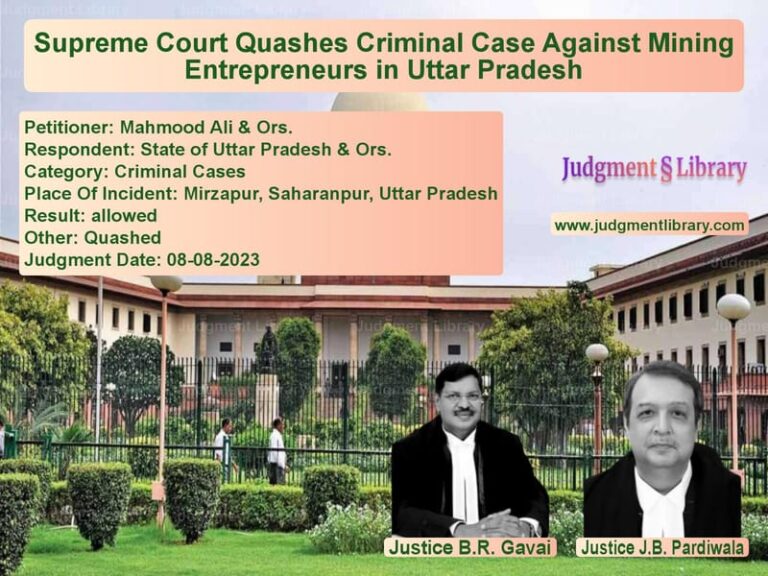Supreme Court Upholds Karnataka High Court’s Reversal of Specific Performance Decree
The Supreme Court of India, in R. Shama Naik v. G. Srinivasiah, upheld the Karnataka High Court’s decision to reverse a trial court’s decree granting specific performance in a real estate contract dispute. The ruling reaffirmed that a plaintiff seeking specific performance must demonstrate both readiness and willingness to fulfill contractual obligations.
Background of the Case
The dispute arose from an agreement of sale dated March 3, 2005, between the petitioner, R. Shama Naik (plaintiff), and the respondent, G. Srinivasiah (defendant). The contract involved the sale of a property for Rs. 30,00,000, with the petitioner paying an earnest money deposit of Rs. 12,50,000 at the time of execution.
The petitioner claimed that he was always ready and willing to perform his part of the contract, but the defendant refused to execute the sale deed. Consequently, he filed Original Suit No. 1101 of 2008 before the trial court, seeking specific performance of the agreement or, alternatively, a refund of the earnest money.
Decisions of Lower Courts
- Trial Court: Ruled in favor of the petitioner and granted a decree for specific performance.
- Karnataka High Court: Allowed the defendant’s appeal, reversing the trial court’s judgment on the grounds that the plaintiff failed to establish readiness and willingness to perform his obligations under the contract.
Key Legal Issues Considered
- Whether the plaintiff proved his continuous readiness and willingness to perform the contract.
- Whether the High Court’s findings on factual evidence warranted interference by the Supreme Court.
- Whether the requirements under Section 16(c) of the Specific Relief Act, 1963, were satisfied.
Arguments of the Petitioner (R. Shama Naik)
- The plaintiff contended that he was financially capable of fulfilling the contractual terms and that the defendant unjustly refused to execute the sale deed.
- The trial court correctly assessed the evidence and found the defendant’s refusal to be unjustified.
- The High Court erred in reversing the trial court’s decree without properly analyzing the evidence.
Arguments of the Respondent (G. Srinivasiah)
- The plaintiff failed to produce conclusive evidence of financial readiness to complete the sale.
- The plaintiff’s conduct did not demonstrate a consistent willingness to perform his contractual obligations.
- The High Court, as the first appellate court, had the authority to re-evaluate factual findings and reached a just conclusion.
Supreme Court’s Observations
On the Requirement of Readiness and Willingness
The Supreme Court reaffirmed that under Section 16(c) of the Specific Relief Act, a plaintiff seeking specific performance must prove both:
- Readiness: The financial ability to make payments as required.
- Willingness: A consistent intention to complete the transaction.
The Court noted:
“It is well settled that a plaintiff must not only make specific statements in the pleadings regarding readiness and willingness but also substantiate them with documentary and oral evidence.”
On the Role of the High Court
The Supreme Court highlighted that findings of fact made by a first appellate court are binding unless shown to be perverse. The High Court, in exercising its jurisdiction, had carefully examined the trial court’s record and found the plaintiff’s evidence insufficient to warrant a decree of specific performance.
Final Judgment
The Supreme Court dismissed the appeal and upheld the High Court’s judgment, holding that:
- The plaintiff failed to establish continuous readiness and willingness.
- The High Court’s findings were based on a proper appreciation of evidence and could not be termed as perverse.
- There was no justification for interfering with the High Court’s order.
Implications of the Judgment
- Reaffirms that specific performance is a discretionary remedy, not an automatic right.
- Emphasizes the necessity of strict compliance with Section 16(c) of the Specific Relief Act.
- Confirms that appellate courts have the authority to re-evaluate factual findings when necessary.
This ruling strengthens the judicial approach to specific performance claims, ensuring that courts grant such relief only when a plaintiff unambiguously proves their readiness and willingness.
Petitioner Name: R. Shama Naik.Respondent Name: G. Srinivasiah.Judgment By: Justice J.B. Pardiwala, Justice R. Mahadevan.Place Of Incident: Bengaluru, Karnataka.Judgment Date: 27-11-2024.
Don’t miss out on the full details! Download the complete judgment in PDF format below and gain valuable insights instantly!
Download Judgment: r.-shama-naik-vs-g.-srinivasiah-supreme-court-of-india-judgment-dated-27-11-2024.pdf
Directly Download Judgment: Directly download this Judgment
See all petitions in Specific Performance
See all petitions in Property Disputes
See all petitions in Contract Disputes
See all petitions in Damages and Compensation
See all petitions in Landlord-Tenant Disputes
See all petitions in Judgment by J.B. Pardiwala
See all petitions in Judgment by R. Mahadevan
See all petitions in dismissed
See all petitions in Quashed
See all petitions in supreme court of India judgments November 2024
See all petitions in 2024 judgments
See all posts in Civil Cases Category
See all allowed petitions in Civil Cases Category
See all Dismissed petitions in Civil Cases Category
See all partially allowed petitions in Civil Cases Category







